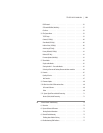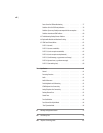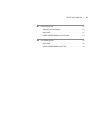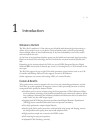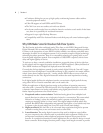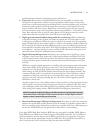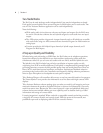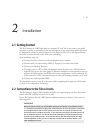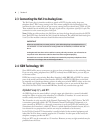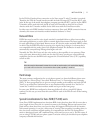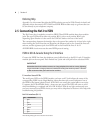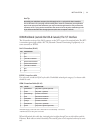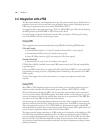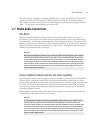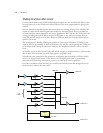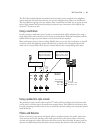
6 | Section 2
2.3 Connecting the Nx12 to Analog Lines
e Nx12 uses plug-in interface modules to attach to POTS (regular, analog loop start,
telephone lines). e Country setting in the Telco menu configures the characteristics of the
interfaces for your country. If you do not see your country listed you should use CTR21 or USA.
ese modules have 6 modular jacks. e type of jack will be a 6 position 4 pin RJ-11 style. e
connection is to the center two pins of this jack.
Note: Unlike our older products, the Nx12 does not have the loop through provision for POTS
lines. e POTS lines used with the Nx12 should be dedicated. e yellow and black leads (pins
2 and 5) of the modular connectors should be disconnected and insulated.
IMPORTANT
When we say POTS lines, we mean just that – plain old analog loop start telephone lines. A
rule of thumb – if a line works with an analog modem or fax machine, it will work with the
Nx12.
Analog Ground Start lines can be used for incoming calls only. However you will need to set
Loop Check in the Telco menu to No for these lines to be recognized properly.
Be careful not to connect the NX12 to PBX ports intended for proprietary telephones. These
sometimes have voltages that could damage the NX12.
2.4 ISDN Technology 101
Since ISDN will be new to some users, we give you here an introduction to the technology here.
If you are using analog telephone lines (POTS) or already know ISDN basics, you can skip on
to the next section.
ISDN lines come in two varieties: Basic Rate Interface (called BRI, SØ, or ISDN 2 in various
parts of the world) and Primary Rate Interface (PRI, S2 or ISDN 30). BRI lines are the kind
we normally see in broadcast stations, as these are what are used with MPEG codecs such as the
Telos Zephyr and Zephyr Xstream. BRIs have a capability of one or two active 64 kbps chan-
nels. Since the Telos Nx12 is used with BRI lines, we will only consider that type here.
Alphabet Soup: U, S, and NT1
An ISDN line from the central office is a single copper pair identical to a normal (unloaded)
analog line. When it arrives at the subscriber, it is called the U-interface. It is a two-wire con-
nection, usually via an RJ-11 style modular jack.
e S-interface is at the user side of the Network Termination Type 1 (NT1) device. e NT1
is sometimes generically called a NCTE (Network Channel Terminating Equipment) or, in
some countries an NTBA. It is a four-wire connection, via an 8-pin RJ-45 style modular jack.
(Sometimes the S-interface is called S/T. ere is a subtle distinction between the two, but it is
not relevant for our purposes here, and the two may be considered to be the same.)
In the USA & Canada NT1 functionality is usually included in the terminal equipment, and
indeed the Nx12 in these countries supports the U-interface. In other parts of the world, the
telephone company provides the NT1.
Only one NT1 may be connected to a U-interface. However, as many as eight terminals may be
paralleled onto the S bus.



